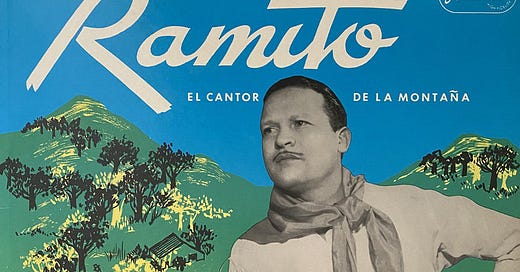EVERY GENRE PROJECT - December 9 - Jibaro
Genre of the Day - Jibaro 🇵🇷
Album of the Day - El cantor de la montaña: Vol. 1 by Ramito (1958)
Today, a dear friend who also grew up in the mountains and I traversed a rather flat portion of LA (sure, the peripheries bloom with majestic peaks and valleys, but not the central part we find ourselves in) on an excursion. Accordingly, today’s random genre is an ode to the mountain life we fondly found ourselves reminiscing on. Mountain music has a certain rustic or mystical character no matter the climate, whether the introspective Rocky Mountains that inspired Fleetwood Mac’s “Landslide,” the passionate falak of the desolate Central Asian Pamirs, or sounds cradled in verdant Caribbean hills as in today’s genre.
Puerto Rico has been synonymous with the urban storytelling of reggaetón that has electrified Latin music since Ivy Queen and Daddy Yankee first popped out in the 2000s, but what for the expressions of its traditional rural communities? The term jíbaro translates to ‘people of the forest’ in Taíno and refers to the music of the jíbaros, the rural and mountain-dwelling communities drawn from Andalusia who historically worked and farmed Spanish landowners' haciendas. As Puerto Rico’s economy became less agrarian, many once-jíbaros migrated to the cities; though the size of the communities may have dwindled over time, it made sustaining the strength of their lifestyles through music paramount. Jíbaros remain an iconic archetype of Puerto Rican culture in their connection to the land and self-sufficiency.
Jibaro music typically draws from Andalusian troubadour styles in conjunction with the African rhythms present on the island since the start of Spain’s imperial domination that made dual use of slavery and the jíbaros’ serfdom. The misleadingly-named cuatro—a small guitar with five strings, not four—is essential to the genre, as portable, everyman string instruments tend to be in rural expressions of music across cultures. Jibaro’s narratives are drawn from centuries-old Spanish styles, in copla rhyming structure or the more esoteric and improvised décima with ten lines in a complicated rhyme scheme, a form derived from medieval Spanish poetic tradition. Ingenuity reflected in the perception of jibaros generally is paramount to the latter form, as the singer often takes the end line form the audience and must trace their steps backwards to craft a verse.
Ramito carried the torch of jibaro music to the summit to the point that he was dubbed the singer of the mountains, a claim made evident on today’s album. Twirling and glistening cuatro melodies rise and fall, gracefully complimenting his drama-laden delivery of “Alegre Navidad,” a Christmas song that equally captures the joy and symbolic intensity of the holiday. The pronounced rustle of the guiro percussion keeps time on “No Me Llames Por Mi Nombre,” adding groundedness to the fluttering, high strums as his tenor sails skyward. “A Los Boricanos” is a salute to the island, the title referencing the popular demonym for Puerto Ricans, group vocals and a fervent horn salute yelling out the legend’s pride from the hills. It’s only in scaling a place’s peaks that you capture the full beauty and life-sustaining capacities of its landscapes—music can provide that view when you don’t have it in you to take a hike.






